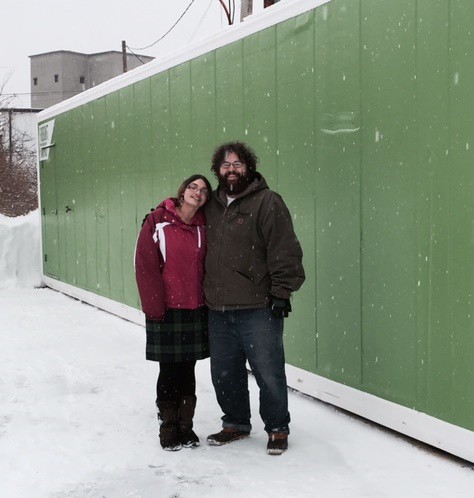
Urban farmers like Lashmit and Pierce avoid high land prices by storing their unit in a portion of a parking lot they rent in Marlborough County.
In the traditional sense, farming has always involved purchasing or leasing land to plow, plant, fertilize and harvest. As world population and land prices grow however, urban boundaries continue to expand, pushing farms and ranches farther away from the center of growing cities.
At the same time, many consumers are more aware of where their food is produced, preferring to purchase food grown locally in their communities. This trend pulls agriculture back into the heart of the city, with many agriculture enthusiasts stepping up to support the demand.
That’s why a pair of avid East Coast gardeners started looking for non-traditional ways to grow their own crops in their urban setting of Marlborough County, Massachusetts.
“We liked the idea of eating fresh, locally grown foods, and after following developments in the urban farming industry, we decided to give it a try,” said Thomas Lashmit.
Lashmit and his girlfriend Megan Pierce both have day jobs but decided to start Friendly Farms, a small-scale urban agriculture operation. With the help of their savings and a USDA Farm Service Agency (FSA) microloan, they were able to purchase a repurposed freight container that is tailored for hydroponically growing vegetables and includes a water system, heating and cooling units and light-emitting diodes (LEDs) designed to mirror sunlight.
FSA has developed many programs targeted towards farmers and ranchers who need assistance to get their start in agriculture. The microloan program allows beginning, small and mid-sized farmers and ranchers to borrow up to $50,000 using a simplified application process. Microloan funds can be used for initial start-up expenses, seed, fertilizer, utilities, land rent, marketing and distributing, family living expenses, purchase of livestock and equipment or other yearly operating expenses.
Lashmit and Pierce purchased the repurposed freight unit in January of 2015 and started growing large-leaf Italian basil. The unit utilizes a vertical growing system with plastic seed channels that contain a growing medium made of mesh that pinches the plant roots to hold the plant in place.
While traditional farmers must purchase or lease land to grow their crops, urban farmers like Lashmit and Pierce pay a fraction of the cost by renting a portion of a parking lot to store their unit.
“We hope to harvest our first crop in May followed by a weekly harvest,” said Lashmit.
Friendly Farms plans to expand their operation by a few units every year.
“The five-year plan is to operate in six units, possibly growing an entire salad supply,” said Lashmit. “We plan to market our produce to local restaurants and grocery stores.”
While urban farming is a new concept, it incorporates cutting edge technology that allows Lashmit and Pierce to control the system remotely by adjusting the lights, pH and nutrient dosing and carbon dioxide level for humidity controls. The unit is also equipped with cameras that allows for remote, real-time monitoring of the crop. At this phase, Lashmit and Pierce spend around six to eight hours a week working on their unit including remote monitoring.
As agriculture continues to evolve around consumer demands, FSA continues to work with beginning farmers and ranchers to help them get their start in the agriculture industry.
For more information on farms loans and other FSA programs, visit www.fsa.usda.gov/farmloans. To find a local FSA office near you, visit http://offices.usda.gov.

Lashmit and Pierce decided they needed more than a garden in order to provide a steady supply of herbs and vegetables to their community. The repurposed freight container will allow them to grow crops more efficiently in their urban setting.
No comments:
Post a Comment